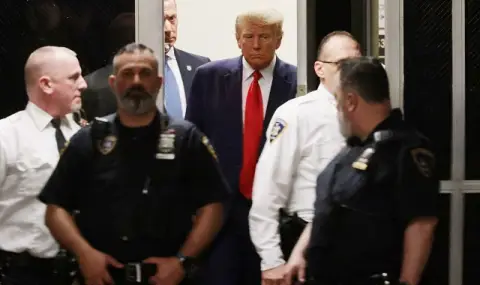A New York prosecutor told jurors that paying to remain silent inconvenient witnesses, at the heart of the criminal trial against former President Donald Trump, is an attempt to "defraud the American voter" during the 2016 elections, reports "Reuters".
Prosecutor Joshua Steinglass said that, for example, the $130,000 that was supposed to ensure that porn star Stormy Daniels would not discuss an alleged sexual encounter was only part of an effort to hide from the public facts that could harm his first bid for the White House.
"We'll never know if this effort to mislead the American voter influenced the election, but that's something we don't need to prove,'' Steinglass said.
Jurors may begin deliberating as early as Wednesday in the first criminal trial against a US president.
Trump, 77, faces 34 felony counts of falsifying business documents to cover up the payment to Daniels. He pleaded not guilty, denied having sex with Daniels and appeared unimpressed by Steinglass' closing arguments.
"BORING!" Trump wrote on social media during a break in the trial.
Earlier in the day, Trump's lawyer told jurors they should not trust star witness Michael Cohen, who testified that as Trump's go-between, he paid Daniels out of his own pocket and devised a plan to to have these amounts officially disguised as attorney's fees.
Trump's attorney Todd Blanch said Cohen, a convicted felon with a long record of lying, misled jurors when he said he discussed the payment and reimbursement plan with Trump.
"He is literally the biggest liar of all time," said Blanche.
Steinglass counters that Cohen's dishonesty is a reflection of Trump's malign influence.
Blanche urged jurors to set aside their personal views of Trump, the 2024 Republican presidential nominee, and determine whether prosecutors have proven their case beyond a reasonable doubt, the standard required by US law.
"If you just focus on the evidence that you heard in this courtroom, it's a very, very quick and easy verdict of not guilty,'' Blanche said.
Blanche said Daniels was trying to blackmail Trump. The defense argued that he approved the payment to spare his family embarrassment.
Steinglass also urged jurors to ignore the politics surrounding the case. "The law is the law. And it applies equally to everyone. There is no special standard for this defendant,'' he said, concluding his remarks.
Mrchan then dismissed jurors for the night and said he would instruct them Wednesday on how to conduct their deliberations.
If convicted, Trump could face up to four years in prison. But imprisonment is unlikely if he is convicted of such a crime for the first time.
Trump also faces three other criminal charges, but none will go to trial before the election. He has pleaded not guilty to all charges and called them an attempt by President Joe Biden to derail his bid for the presidency.
A conviction will not prevent Trump from trying to retake the White House from President Biden in the Nov. 5 election. Nor will it prevent him from taking office if he wins. Polls show the two men are in a tight race.
